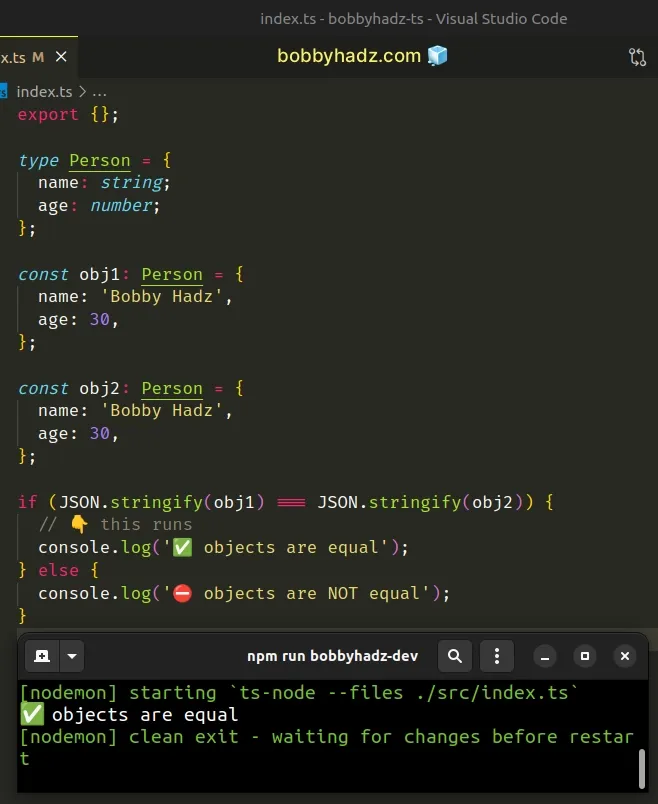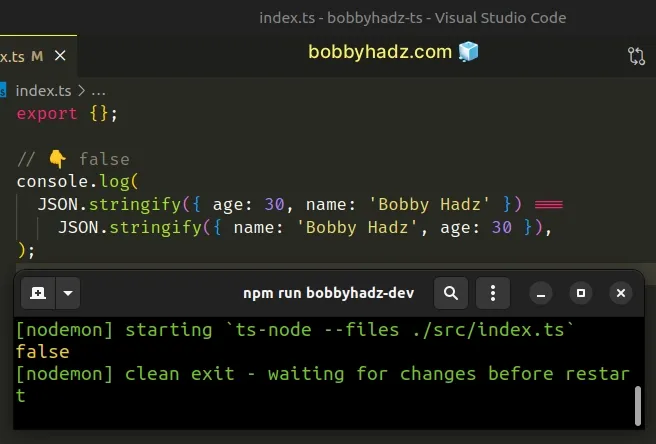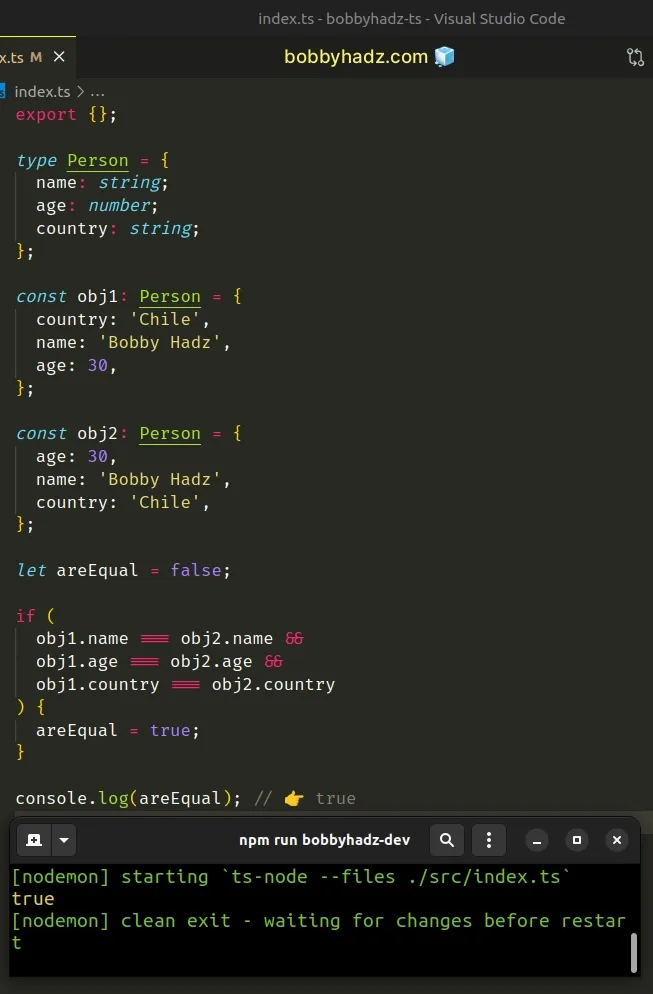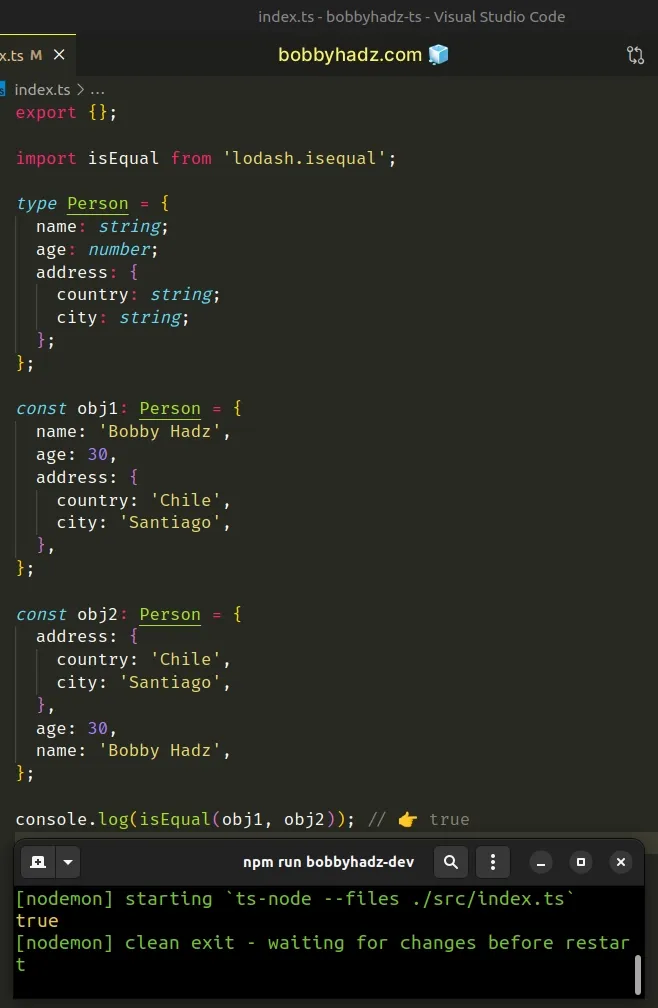How to compare Objects in TypeScript
Last updated: Feb 27, 2024
Reading time·4 min

# Table of Contents
- Comparing Objects in TypeScript
- Shallow Comparison of Objects in TypeScript
- Deep Comparison of Objects in TypeScript
# Comparing Objects in TypeScript
To compare objects in TypeScript:
- Use
JSON.stringify()to compare objects whose keys are in the same order. - Do a shallow comparison if the objects aren't nested.
- Use
lodash.isEqualto test for deep equality of objects.
The JSON.stringify method can be used to compare objects when the order of the
keys in the two objects is the same.
type Person = { name: string; age: number; }; const obj1: Person = { name: 'Bobby Hadz', age: 30, }; const obj2: Person = { name: 'Bobby Hadz', age: 30, }; if (JSON.stringify(obj1) === JSON.stringify(obj2)) { // 👇️ this runs console.log('✅ objects are equal'); } else { console.log('⛔️ objects are NOT equal'); }

We used the JSON.stringify method to convert the objects to strings and then we compared the results.
Note that this approach should only be used if the order of the keys in the two objects is the same.
For example, the following comparison returns false.
// 👇️ false console.log( JSON.stringify({ age: 30, name: 'Bobby Hadz' }) === JSON.stringify({ name: 'Bobby Hadz', age: 30 }), );

# Using the logical AND (&&) operator to compare objects
If your objects contain only a few key-value pairs that you know about in advance, use the logical AND (&&) operator and compare the key-value pairs.
type Person = { name: string; age: number; country: string; }; const obj1: Person = { country: 'Chile', name: 'Bobby Hadz', age: 30, }; const obj2: Person = { age: 30, name: 'Bobby Hadz', country: 'Chile', }; let areEqual = false; if ( obj1.name === obj2.name && obj1.age === obj2.age && obj1.country === obj2.country ) { areEqual = true; } console.log(areEqual); // 👉️ true

The objects in the example only have a few key-value pairs that we can manually
compare in an if statement without overcomplicating things.
# Shallow Comparison of Objects in TypeScript
If your objects don't have nested properties, you can do a relatively simple shallow comparison.
type Person = { name: string; age: number; }; const obj1: Person = { name: 'Bobby Hadz', age: 30, }; const obj2: Person = { age: 30, name: 'Bobby Hadz', }; // ✅ Shallow comparison const shallowComparison = Object.keys(obj1).length === Object.keys(obj2).length && (Object.keys(obj1) as (keyof typeof obj1)[]).every((key) => { return ( Object.prototype.hasOwnProperty.call(obj2, key) && obj1[key] === obj2[key] ); }); console.log(shallowComparison); // 👉️ true
We used the Object.keys() method to get an array of the keys of the two objects.
The next step is to check if the two objects have the same number of key-value pairs.
The second comparison we did was to check if every key in the first object exists in the second object.
We had to use a
type assertion
when typing the result of the Object.keys() method, because TypeScript sets
the type to string[] and we need the type of the array to only consist of the
object's keys.
The last thing we need to check is if the same keys in the two objects return the same values.
The
every
method will short-circuit, returning false if the condition isn't met at least
once.
Otherwise, the every method returns true and the shallow equality check
passes.
# Deep Comparison of Objects in TypeScript
The easiest way to perform a deep comparison of objects in TypeScript is to install and use the lodash.iseQual library.
Open your terminal in the root directory of your project and install lodash
with the following 2 commands.
npm install lodash.isequal npm install --save-dev @types/lodash.isequal
Now you can use the library to test the objects for deep equality.
import isEqual from 'lodash.isequal'; type Person = { name: string; age: number; address: { country: string; city: string; }; }; const obj1: Person = { name: 'Bobby Hadz', age: 30, address: { country: 'Chile', city: 'Santiago', }, }; const obj2: Person = { address: { country: 'Chile', city: 'Santiago', }, age: 30, name: 'Bobby Hadz', }; console.log(isEqual(obj1, obj2)); // 👉️ true

The isEqual method performs a deep
comparison between the passed-in values and returns a boolean result - true if
they are equal and false otherwise.
The method supports comparing objects, arrays, Maps, Date objects, Sets, etc.
This is the preferred approach when you have to do a deep comparison of objects, because implementing a function that solves this problem is relatively complicated.
# Additional Resources
You can learn more about the related topics by checking out the following tutorials:
- How to merge Arrays in TypeScript
- This comparison appears to be unintentional because the types 'X' and 'Y' have no overlap
- Destructuring Object parameters in TypeScript functions
- How to Remove a Property from an Object in TypeScript
- How to initialize a typed Empty Object in TypeScript
- A spread argument must either have a tuple type or be passed to a rest parameter

